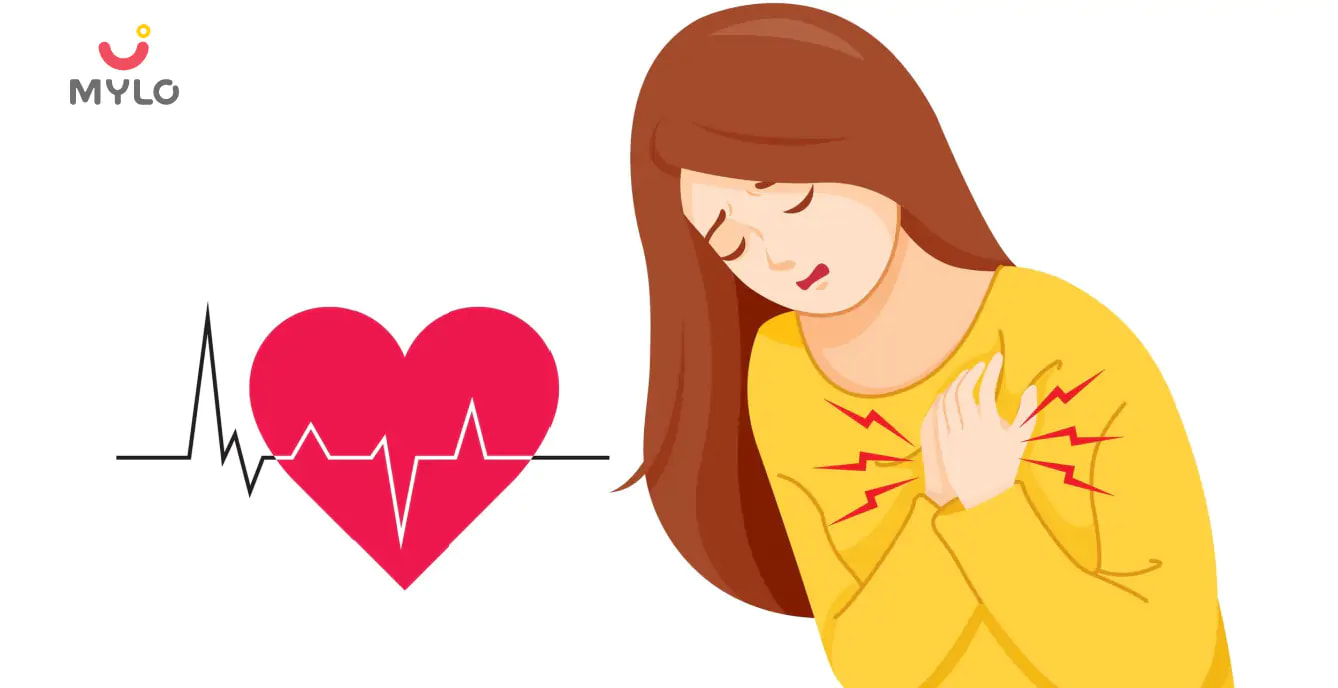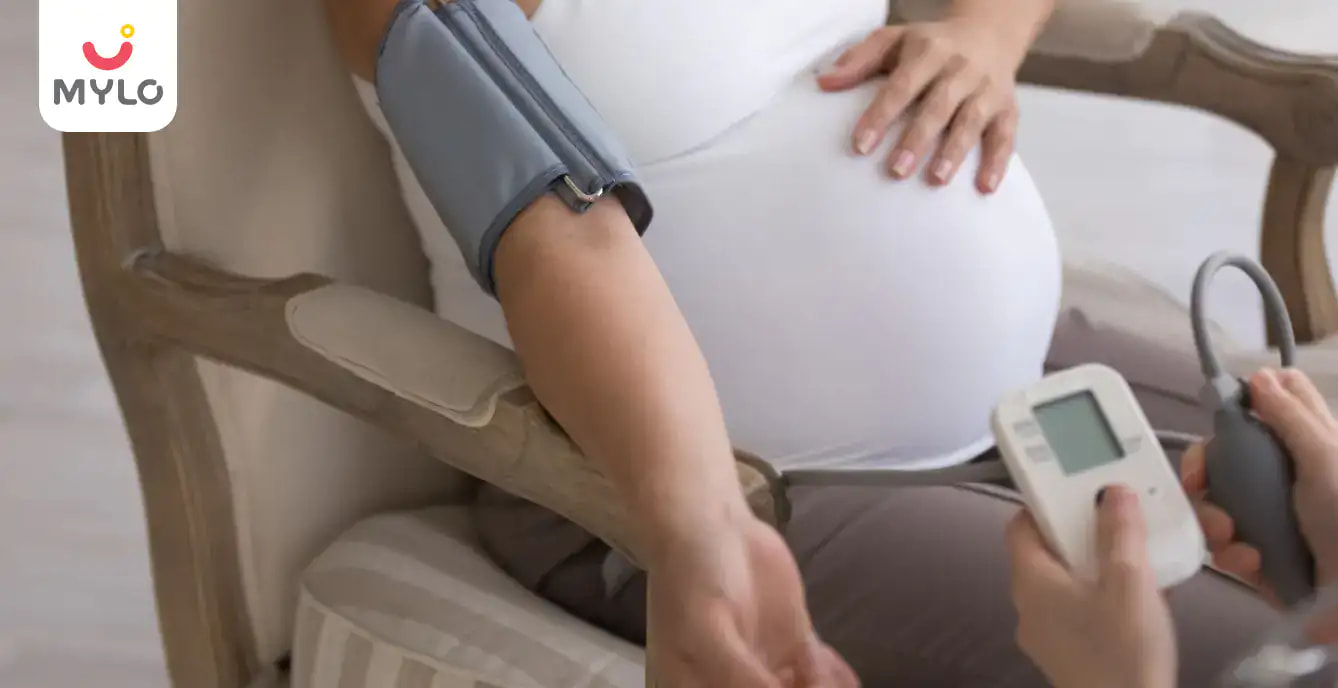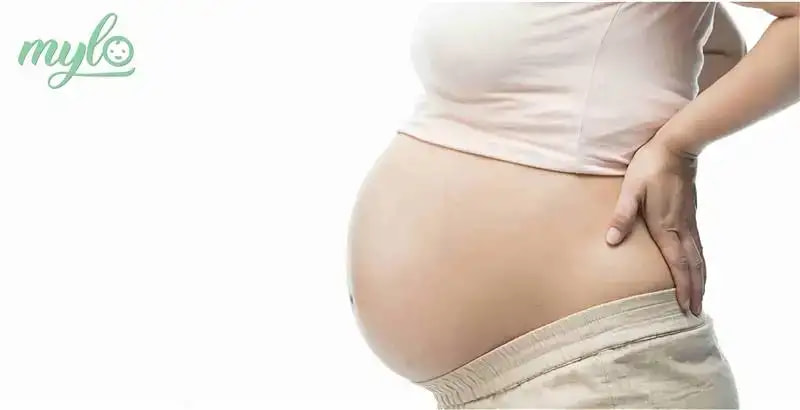Home

Palpitation in Pregnancy: Symptoms, Causes & Treatment
In this Article

Palpitation in Pregnancy: Symptoms, Causes & Treatment
Updated on 3 November 2023
Numerous physical and psychological changes occur throughout pregnancy! Along with the apparent symptoms, such as a growing stomach, there are some less noticeable ones. Heart palpitations are one instance. Heart palpitations during pregnancy can be common and harmless. Learn more about palpitations in pregnancy in this blog.
What are heart palpitations in pregnancy?
During heart palpitations, your heart may feel like it is racing, hammering, or beating too quickly. Your heart rate may increase, decrease, or skip a beat. Some people experience an extra heartbeat.
Your body's blood volume greatly increases during pregnancy. So, to circulate the additional blood throughout your body and the foetus, your heart must work harder, which causes heart palpitation in pregnancy.
Also read: How to Check Pulse Rate During Pregnancy?
How common are heart palpitations during pregnancy?
Heart palpitations during pregnancy are common. As women enter their third trimester, as the foetus continues to develop, it needs more blood as it grows to be healthy. Due to this, palpitations have become more prevalent.
You are more likely to experience pregnancy heartbeat symptoms if you have an arrhythmia or another type of cardiac illness before becoming pregnant. While you are pregnant, they could happen more frequently.
Symptoms of heart palpitations during pregnancy
Symptoms of heart palpitation in pregnancy are:
1. Fluttering
Some persons claim to experience a fluttering or flapping sensation in their chest. Your heart may feel as though it is beating rapidly.
2. Skipped heartbeat
An irregular heartbeat or a heartbeat that alternates between speeding up and slowing down are all symptoms of an irregular heartbeat. You might also experience a late heartbeat during pregnancy.
3. Pounding
Your heart may feel like it is pounding or working very hard. Some individuals who experience heart palpitations claim they can hear their heartbeat in their ears.
You may also like: Symptoms & Management of High Blood Pressure in Pregnancy
Causes of heart palpitations during pregnancy
Various variables might impact your likelihood of experiencing heart palpitations in pregnancy. They consist of the following:
-
Depression and anxiety
-
Both electrolyte abnormalities and dehydration
-
Obesity and excess weight
-
Pregnancy-related hormonal alterations
-
Low blood sugar
Heart palpitations are less frequently brought on by a disease or problem, such as:
-
Heart rhythm issues (arrhythmias), such as atrial fibrillation (Afib).
-
Myocarditis is an infection-related inflammation of the heart muscle.
-
Issues with the thyroid, such as hyperthyroidism.
-
Heart structural issues, such as valve dysfunction.
Diagnosis for heart palpitations during pregnancy
Your healthcare professional will inquire about your pregnancy heartbeat symptoms and check your heart. They might suggest a blood test to look for an underlying condition (complete blood count or CBC).
They might perform an Electrocardiogram (EKG or ECG) to keep track of your heart rate and look for cardiac illness. With sensors attached to your skin, this test calculates your heart rate. This test can be done without risk when pregnant. A lot of the time, an EKG misses heart palpitations. During the test, you might have a normal heartbeat. In such a situation, your doctor could advise an ambulatory electrocardiogram, such as a Holter monitor.
Treatment and management of heart palpitations during pregnancy
Heart palpitations during pregnancy typically don't need to be treated. Your doctor could suggest dietary and lifestyle modifications if they only occur seldom and are not caused by a heart ailment or other health issue. These consist of the following:
1. Increase Water Consumption
It's crucial to maintain hydration during pregnancy. So, your body requires more fluids to keep you and the foetus healthy. Avoid using tobacco and alcohol while pregnant. Alcohol and smoking raise the risk of fetal heart palpitations and injury.
2. Limiting caffeine, sugar, and fat
It is advised because these substances can exacerbate heart palpitations. Limit your daily coffee intake to one cup, and consume chocolate and other sugary or caffeinated items in moderation. Reduce your intake of foods heavy in fat or sodium (salt).
3. Practising Relaxing Techniques
If you're experiencing heart palpitations, try practising relaxation techniques. Take long, deep breaths through your nose and out through your mouth. You can also practice meditation and pursed-lip breathing.
Your healthcare professional will create a safe treatment plan for you and your foetus if you have heart disease or another health issue producing palpitations. The cause determines the different treatments.
How to prevent heart palpitations during pregnancy?
Heart palpitations during pregnancy may not be preventable, but you can reduce your risk. You ought to:
-
Avoid foods that are heavy in fat, carbohydrates, salt, or sugar, and maintain a balanced diet.
-
Get help if you're depressed or anxious.
-
Avoid drinking and smoking.
-
Limit your caffeine intake.
-
Keep a healthy weight.
-
Try yoga or meditation. Additionally, to reduce tension, try breathing and other relaxing methods.
-
Visit your doctor frequently.
Conclusion
While heart palpitations during pregnancy are undoubtedly uncomfortable, they are typically not dangerous. However, it is still best not to disregard any pregnancy heartbeat symptoms; therefore, you should inform your doctor. Some treatments can support your child's and your health. Visit the MyloFamily website to learn more about parenting, baby care, and elderly care.
References
1. Adamson, D. L., & Nelson-Piercy, C. (2008). Managing palpitations and arrhythmias during pregnancy. Postgraduate Medical Journal,
2. Choi, H. S., Han, S. S., Choi, H. A., Kim, H. S., Lee, C. G., Kim, Y. Y., Hwang, J. J., Park, J. B., & Shin, H. H. (2001). Dyspnea and Palpitation during Pregnancy. The Korean Journal of Internal Medicine
Tags
Palpitation in Pregnancy: Symptoms, Causes & Treatment in Hindi, Palpitation in Pregnancy: Symptoms, Causes & Treatment in Tamil, Palpitation in Pregnancy: Symptoms, Causes & Treatment in Telugu, Palpitation in Pregnancy: Symptoms, Causes & Treatment in Bengali



Written by
Loveleen Gupta
A working mother with more than two decades of experience in writing for the publishing industry and digital space, Loveleen Gupta loves dabbling in creative writing also. A graduate from Miranda House, she uses her personal experiences to express herself.
Read MoreGet baby's diet chart, and growth tips

Related Articles
Related Questions
Hello frnds..still no pain...doctor said head fix nhi hua hai..bt vagina me pain hai aur back pain bhi... anyone having same issues??

Kon kon c chije aisi hai jo pregnancy mei gas acidity jalan karti hain... Koi btayega plz bcz mujhe aksar khane ke baad hi samagh aata hai ki is chij se gas acidity jalan ho gyi hai. Please share your knowledge

I am 13 week pregnancy. Anyone having Storione-xt tablet. It better to have morning or night ???

Hlo to be moms....i hv a query...in my 9.5 wk i feel body joint pain like in ankle, knee, wrist, shoulder, toes....pain intensity is high...i cnt sleep....what should i do pls help....cn i cosult my doc.

Influenza and boostrix injection kisiko laga hai kya 8 month pregnancy me and q lagta hai ye plz reply me

RECENTLY PUBLISHED ARTICLES
our most recent articles

Diet & Nutrition
গর্ভাবস্থায় আলুবোখরা: উপকারিতা ও ঝুঁকি | Prunes During Pregnancy: Benefits & Risks in Bengali

Diet & Nutrition
গর্ভাবস্থায় হিং | ঝুঁকি, সুবিধা এবং অন্যান্য চিকিৎসা | Hing During Pregnancy | Risks, Benefits & Other Treatments in Bengali

Women Specific Issues
স্তনের উপর সাদা দাগ: লক্ষণ, কারণ এবং চিকিৎসা | White Spots on Nipple: Causes, Symptoms, and Treatments in Bengali

Diet & Nutrition
গর্ভাবস্থায় পোহা: উপকারিতা, ধরণ এবং রেসিপি | Poha During Pregnancy: Benefits, Types & Recipes in Bengali

Diet & Nutrition
গর্ভাবস্থায় মাছ: উপকারিতা এবং ঝুঁকি | Fish In Pregnancy: Benefits and Risks in Bengali

Diet & Nutrition
গর্ভাবস্থায় রেড ওয়াইন: পার্শ্ব প্রতিক্রিয়া এবং নির্দেশিকা | Red Wine During Pregnancy: Side Effects & Guidelines in Bengali
- ইনার থাই চ্যাফিং: কারণ, উপসর্গ এবং চিকিৎসা | Inner Thigh Chafing: Causes, Symptoms & Treatment in Bengali
- গর্ভাবস্থায় ব্রাউন রাইস: উপকারিতা ও সতর্কতা | Brown Rice During Pregnancy: Benefits & Precautions in Bengali
- Velamentous Cord Insertion - Precautions, Results & Safety
- Unlock the Secret to Flawless Skin: 7 Must-Have Qualities in a Face Serum
- Unlock the Secret to Radiant Skin: How Vitamin C Serum Can Transform Your Complexion
- Gender No Bar: 10 Reasons Why Everyone Needs a Body Lotion
- Unlock the Secret to Radiant Skin How to Choose the Perfect Body Lotion for Your Skin Type
- Top 10 Reasons to Apply a Body Lotion After Every Bath
- Communication in Toddlers: Milestones & Activities
- How to Improve Vocabulary for Toddlers?
- A Comprehensive Guide to Understanding Placenta Accreta
- Vulvovaginitis in Toddlers Causes, Symptoms and Treatment
- A Comprehensive Guide to Understanding Cerebral Palsy in Children
- Bitter Taste in Mouth During Pregnancy: Understanding the Causes and Remedies


AWARDS AND RECOGNITION

Mylo wins Forbes D2C Disruptor award

Mylo wins The Economic Times Promising Brands 2022
AS SEEN IN

- Mylo Care: Effective and science-backed personal care and wellness solutions for a joyful you.
- Mylo Baby: Science-backed, gentle and effective personal care & hygiene range for your little one.
- Mylo Community: Trusted and empathetic community of 10mn+ parents and experts.
Product Categories
baby carrier | baby soap | baby wipes | stretch marks cream | baby cream | baby shampoo | baby massage oil | baby hair oil | stretch marks oil | baby body wash | baby powder | baby lotion | diaper rash cream | newborn diapers | teether | baby kajal | baby diapers | cloth diapers | laundry detergent 6472 | lactomama lactation granules |








